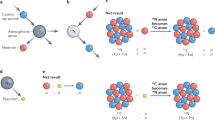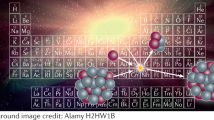Abstract
AT the discussion on isotopes at the Royal Society on March 3 the question was raised as to within what limits of accuracy the conclusion is justified that the atomic volume of the various isotopes of lead is constant, and the following collected results may therefore be of interest. There are two sets of data. In one the density and atomic weight of lead from thorite have been compared with the values of ordinary lead, and in the other a similar comparison has been made for the lead derived from two uranium minerals. These two sets, of course, cannot be compared together, as the densities of specimens are comparable only when they have been prepared under identical conditions. With due attention to this point the relative densities are, in the case of lead, capable of determination to a very high degree of accuracy.
This is a preview of subscription content, access via your institution
Access options
Subscribe to this journal
Receive 51 print issues and online access
$199.00 per year
only $3.90 per issue
Buy this article
- Purchase on Springer Link
- Instant access to full article PDF
Prices may be subject to local taxes which are calculated during checkout
Similar content being viewed by others
Rights and permissions
About this article
Cite this article
SODDY, F. The Atomic Volume of Isotopes. Nature 107, 41–42 (1921). https://doi.org/10.1038/107041c0
Issue Date:
DOI: https://doi.org/10.1038/107041c0
This article is cited by
-
Sulla Isotopia Degli Elementi
Il Nuovo Cimento (1921)
Comments
By submitting a comment you agree to abide by our Terms and Community Guidelines. If you find something abusive or that does not comply with our terms or guidelines please flag it as inappropriate.



